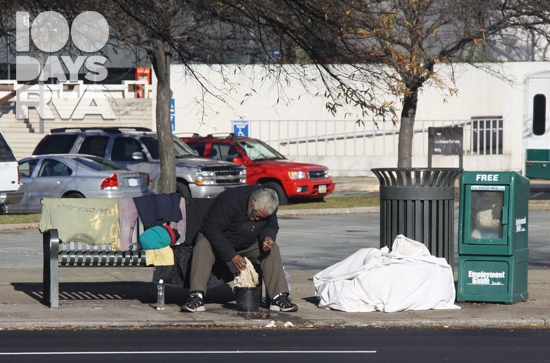Day #021: RVA Survival Station and an RVA Coin
Richmond has no shortage of panhandlers and no shortage of people who want to help, but simply giving money to every person who asks on the street is unreasonable and, in many ways, inefficient.

Inspired by Michael Bierut’s 100 Day Project, 100 Days to a Better RVA strives to introduce and investigate unique ideas to improving the city of Richmond. View the entire project here and the intro here.
- Idea: Build an “RVA Survival Station” and introduce an “RVA Coin”
- Difficulty: 3 — This project would require a few motivated people giving up a lot of sleep to get it running.
Designers, particularly in Europe, are starting to enter the field of social innovation: design aimed at improving people’s lives. In 1995, Köln International School of Design created a design project for a survival station for the homeless. In 2001, the project became a reality when “Gulliver Survival Station” opened its doors in a space connected to Köln’s main train station. Its main goal: close the gap in the net of social facilities. Unlike most shelters which are only open at night, Gulliver is open from 6:00 AM to 10:00 PM.
The facility allows individuals to rent mailboxes, recharge electronics, use bathrooms with showers, do laundry, sleep during the day, and interact. The space was fodder for academic research, and in 2006, KISD returned to evaluate how guests perceived the station and how services could be improved.
This evaluation inspired the Gulliver Coin: a coin that can be purchased at all supermarkets and kiosks that individuals can give to beggars instead of normal currency. The coin can be used to purchase services at Gulliver or goods like food and drinks in the store at Gulliver. The coin strikes a healthy balance between the ideas of paternalism1 and rational choice.2
Richmond has no shortage of panhandlers and no shortage of people who want to help, but simply giving money to every person who asks on the street is unreasonable and, in many ways, inefficient.
Many people feel uneasy giving money to beggars because it’s impossible to know their true condition, and because they don’t know how that money will be used. I usually fall in this camp. If someone asks for money, I acknowledge them as a human being and tell them why I can’t or won’t give them cash or change. If they ask for food, sometimes I’ll run home and make something or run into a convenience store. I’d be much more willing to give an “RVA Coin” than actual currency.
The “RVA Coin” could be used as a way to fund the survival station, too. The first way this could happen is by charging double the face value for the coins. What is worth $1 in the store would cost $2 for people wishing to donate. The extra amount would go to paying the bills. Money spent on lost or unredeemed coins would eventually end up in the survival stations’ general fund.
It’s easy to simply expect every person without housing to find their ways out of sight and out of mind at homeless shelters and soup kitchens. Unfortunately, many shelters in Richmond have waiting lists. Furthermore, getting access to housing or shelters is an uphill battle for people with criminal records or substance abuse problems. That should not unambiguously shove everyone outside of the net.
The survival station could be run by the city or a private charity. It could even be an extension of the existing Homeless Point of Entry. It should never be perceived as an attempt to reform or police an entire class of people in the Richmond area. A bulletin board with information about help and a friendly staff should be the extent of its attempts at reforming or changing people.
The station would also eventually give some individuals opportunities to gain job experience. Hopefully the combination of a mailbox, some stability, a small bit of work experience, and a closet with donated formal clothing would help some individuals find employment.
Hundreds of people around Richmond struggle to find basic housing. Regardless of the source of individuals’ struggles, everyone deserves a basic level of comfort. The “RVA survival station” would be a way to help improve the lives of those in need without expanding the welfare state or creating new legislation.
Love this idea? Think it’s terrible? Have one that’s ten times better? Head over to the 100 Days to a Better RVA Facebook page and join in the conversation.
Photo by: Gamma Man
- Giving with limitations for the recipients’ own “good.” ↩
- Individuals know their own needs the best and they optimize spending accordingly. This idea is the basis for GiveDirectly. ↩
-
Recommend this
on Facebook -

Report an error
-

Subscribe to our
Weekly Digest





There are no reader comments. Add yours.